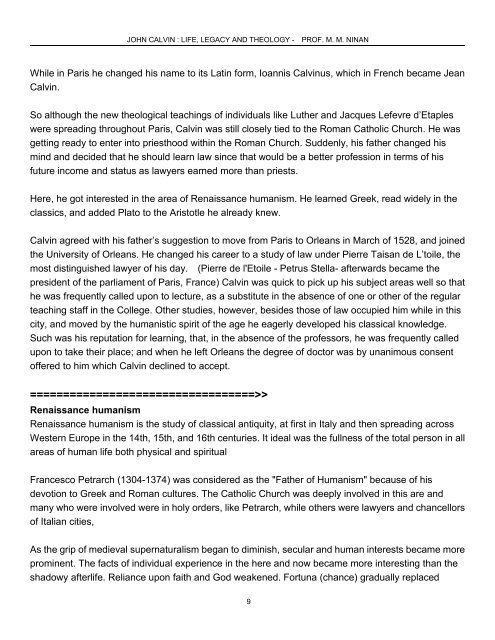You also want an ePaper? Increase the reach of your titles
YUMPU automatically turns print PDFs into web optimized ePapers that Google loves.
JOHN CALVIN : LIFE, LEGACY AND THEOLOGY -<br />
PROF. M. M. NINAN<br />
While in Paris he changed his name to its Latin form, Ioannis <strong>Calvin</strong>us, which in French became Jean<br />
<strong>Calvin</strong>.<br />
So although the new theological teachings of individuals like Luther <strong>and</strong> Jacques Lefevre d’Etaples<br />
were spreading throughout Paris, <strong>Calvin</strong> was still closely tied to the Roman Catholic Church. He was<br />
getting ready to enter into priesthood within the Roman Church. Suddenly, his father changed his<br />
mind <strong>and</strong> decided that he should learn law since that would be a better profession in terms of his<br />
future income <strong>and</strong> status as lawyers earned more than priests.<br />
Here, he got interested in the area of Renaissance humanism. He learned Greek, read widely in the<br />
classics, <strong>and</strong> added Plato to the Aristotle he already knew.<br />
<strong>Calvin</strong> agreed with his father’s suggestion to move from Paris to Orleans in March of 1528, <strong>and</strong> joined<br />
the University of Orleans. He changed his career to a study of law under Pierre Taisan de L’toile, the<br />
most distinguished lawyer of his day. (Pierre de l'Etoile - Petrus Stella- afterwards became the<br />
president of the parliament of Paris, France) <strong>Calvin</strong> was quick to pick up his subject areas well so that<br />
he was frequently called upon to lecture, as a substitute in the absence of one or other of the regular<br />
teaching staff in the College. Other studies, however, besides those of law occupied him while in this<br />
city, <strong>and</strong> moved by the humanistic spirit of the age he eagerly developed his classical knowledge.<br />
Such was his reputation for learning, that, in the absence of the professors, he was frequently called<br />
upon to take their place; <strong>and</strong> when he left Orleans the degree of doctor was by unanimous consent<br />
offered to him which <strong>Calvin</strong> declined to accept.<br />
==================================>><br />
Renaissance humanism<br />
Renaissance humanism is the study of classical antiquity, at first in Italy <strong>and</strong> then spreading across<br />
Western Europe in the 14th, 15th, <strong>and</strong> 16th centuries. It ideal was the fullness of the total person in all<br />
areas of human life both physical <strong>and</strong> spiritual<br />
Francesco Petrarch (1304-1374) was considered as the "Father of Humanism" because of his<br />
devotion to Greek <strong>and</strong> Roman cultures. The Catholic Church was deeply involved in this are <strong>and</strong><br />
many who were involved were in holy orders, like Petrarch, while others were lawyers <strong>and</strong> chancellors<br />
of Italian cities,<br />
As the grip of medieval supernaturalism began to diminish, secular <strong>and</strong> human interests became more<br />
prominent. The facts of individual experience in the here <strong>and</strong> now became more interesting than the<br />
shadowy afterlife. Reliance upon faith <strong>and</strong> God weakened. Fortuna (chance) gradually replaced<br />
9

















